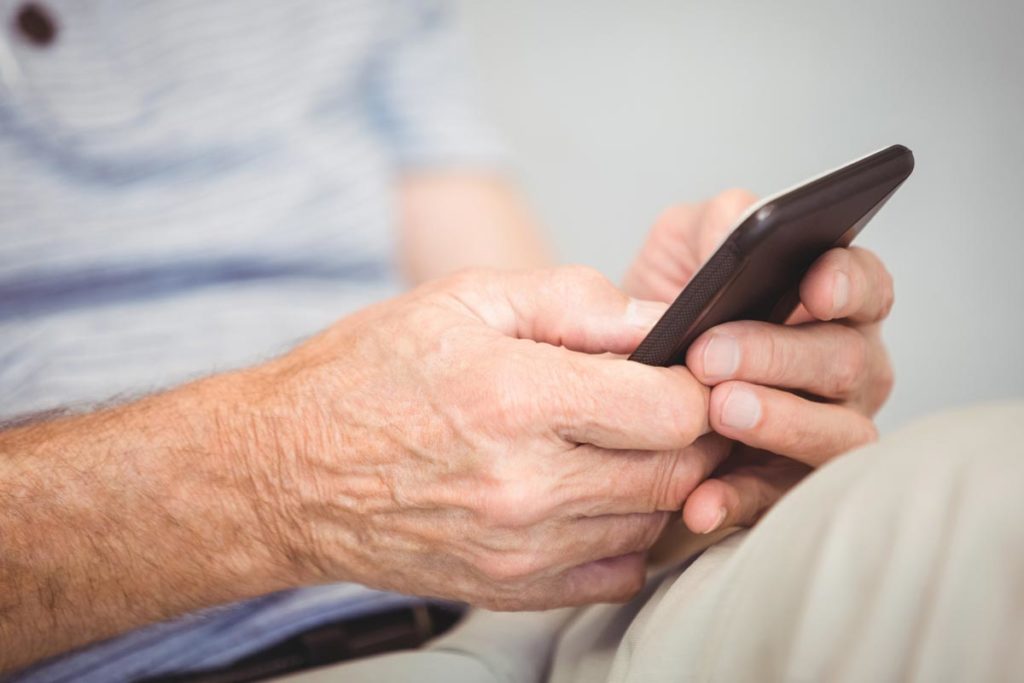If you’re ready to buy a cellphone for the first time, or are looking for something different, it’s good to know your options. First, you’ll want to decide what features are most important for you and your lifestyle. Do you need extra large text? A great camera for video chatting with the grandkids? A smartphone to help you manage your smart devices? A simple phone that’s only for emergency calls? Making these choices is the first step in finding the right phone and the right plan.
A Growing Trend
While it may seem like everyone owns a cellphone, according to a Pew Research Center report, there’s a disparity between adults under 30 and adults 65 and older who own one. Fortunately, in the last decade, that disparity has shrunk from 53 points in 2012 to 35 points in 2021. Among older adults ages 65 and older, about 85% reportedly own a cellphone, with 46% using a smartphone and 40% using a regular cellphone.
Why Do You Need a Cellphone?
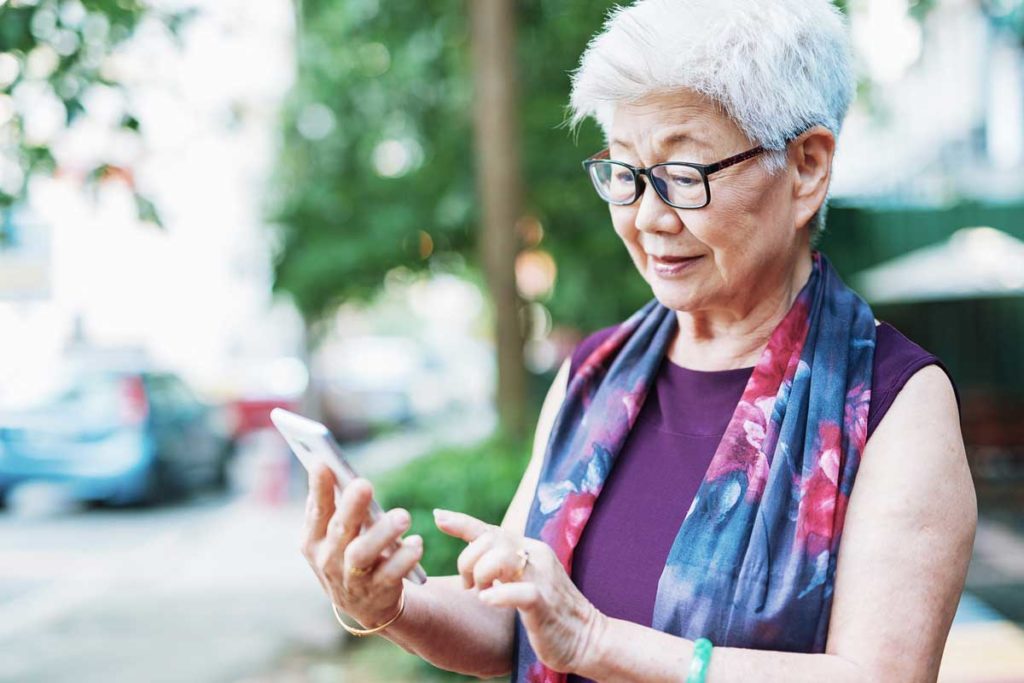
These days we use our smartphones for nearly everything, but when choosing a new phone, it’s helpful to narrow down your primary purpose. Figuring out what you’ll use your phone for can help you pick a model and a voice and data plan. Here are a few common uses:
- Making emergency phone calls
- Video chatting with grandchildren
- Controlling your smart devices, like your smart thermostat or smart lock
- Texting with friends
- Using GPS to help navigate when driving or walking
- Checking the weather on the go
- Looking at date and time
- Monitoring health through apps
- Accessing the internet
- Playing games and puzzles
Cell Phone Options

Once you determine what you’ll need your cell phone for, you can start narrowing down your choices. Here are a few categories of cellphones to get you started:
You can shop, manage your stocks, edit photos, track your daily footsteps, read the news, play games and more.
Flip Phones
These basic phones flip open to reveal a keypad and screen, which makes them simple and easy-to-use. Consider this phone if you feel overwhelmed by too many features and prefer to keep it basic. With a flip phone, it’s important to note that you won’t be able to video chat, use the internet, or help navigate when you’re traveling. Then again, this may be just what you’re searching for.
Candybar or Block Phones
Named for their chunky rectangular build, these block-like phones don’t require any flipping, which may be helpful if you have arthritic wrists or other dexterity issues. The keypad is located right on the face of the phone, along with a non-touch screen. Like flip phones, these bar phones typically don’t come equipped with internet connectivity, so pick this option if you only want to use your phone for calls and texting.
Smartphones
These more complex phones represent the biggest category of cellphones today. Through apps and internet connectivity, they offer countless options for entertainment and practical applications. You can shop, manage your stocks, edit photos, track your daily footsteps, read the news, play games, and more. Smartphones can also help older adults manage their IoT, (Internet of Things) or smart devices, around the house. Just make sure you’re comfortable using a touchscreen before selecting this type of phone.
Pros of Owning a Smartphone

Smart Devices
If you or the older adult you care for lives alone, you may find it beneficial to install smart devices around your home. If you do so, a smartphone is essential for managing these products. These are typically controlled through specialized apps that you can access through your phone. Installing these smart devices can allow you to turn on your lights, thermostat, door locks, garage, or even your radio right from your smartphone.
Smartphones can provide hours of entertainment, but they can also make life easier and more efficient.
Entertainment
If you live alone, a smartphone can help guard against boredom and loneliness, thanks to games, audiobooks, social media, and video chatting. Audiobooks and podcasts can help you if you have reduced vision, and you can listen to music and even watch a favorite show.
Greater Sharing Capacity
A smartphone can make you feel more connected since you can easily send and receive pictures and videos from loved ones. This can be especially helpful if you live far away from friends and grandchildren. Smartphones also enable video chat apps such as WhatsApp and FaceTime, which can help you stay connected.
Practical Apps
Smartphones can provide hours of entertainment, but they can also make life easier and more efficient. You can use apps to help you remember where you parked, ensure that you take your medication on time, communicate with your doctor, and receive severe weather alerts, among other capabilities.
Stimulation
According to WebMD, cellphones can help reduce your chances of developing dementia through brain stimulating games and activities. This is further supported by a study that looked at how adults aged 60–80 were impacted when they played video games each day over the course of the four-week study. The conclusion was that video games are a therapeutic activity that can help reduce age-related cognitive decline.
Virtual Assistants
iPhones and most Androids come equipped with a virtual assistant. These personal assistants respond to voice commands and questions like, “Call Jenny,” or “How many feet are in a mile?” You may find these particularly useful, since they eliminate the need to type full sentences on the keypad and can help you navigate a new phone.
iPhones come equipped with Siri, the Apple virtual assistant, while Android come equipped with Google Assistant.
Electronic Tracking
Electronic tracking tiles can be added to items you might misplace, like that pesky remote control, which you can then track with your phone. Turn on the alert from your phone, and the tile you’ve added will make a beeping noise, leading you to the misplaced object.
Cons of Owning a Smartphone

If you do opt for a smartphone, make sure you’re careful when downloading apps.
Expense
Even the most basic smartphone will cost you at least a hundred dollars, with some of the top-of-the-line phones almost reaching the thousand-dollar price point. This means it may only be worth the money if you plan on using many of the features. Additionally, some cellphone carriers lock customers into a long-term contract, so you’ll be paying a monthly fee for at least a year or more. A smartphone plan will also require that you pay for data, or the internet that’s used to host your apps, in addition to basic calls and texting, making it more expensive than a basic phone plan.
Accidental Spending
In addition to the price of the phone itself, you’ll be faced with many opportunities to spend money on apps and online shopping. If you do opt for a smartphone, make sure you’re careful when downloading apps. Some are free to download but offer sneaky in-app purchases that may cause you to spend more while using the app, often without even realizing it.
Harder to Set Up
Smartphones may be more complicated to set up than basic phones. If you need help, ask a friend or family member to help you set up your phone or ask a store representative to help you before you leave the store. If you’re trading in an older phone for a new one, make sure you ask the tech to help you transfer your data and contacts to the new device.
iPhones come equipped with Siri, the Apple virtual assistant, while Android users can choose from a range of apps that perform similar tasks.
Androids vs. iPhones
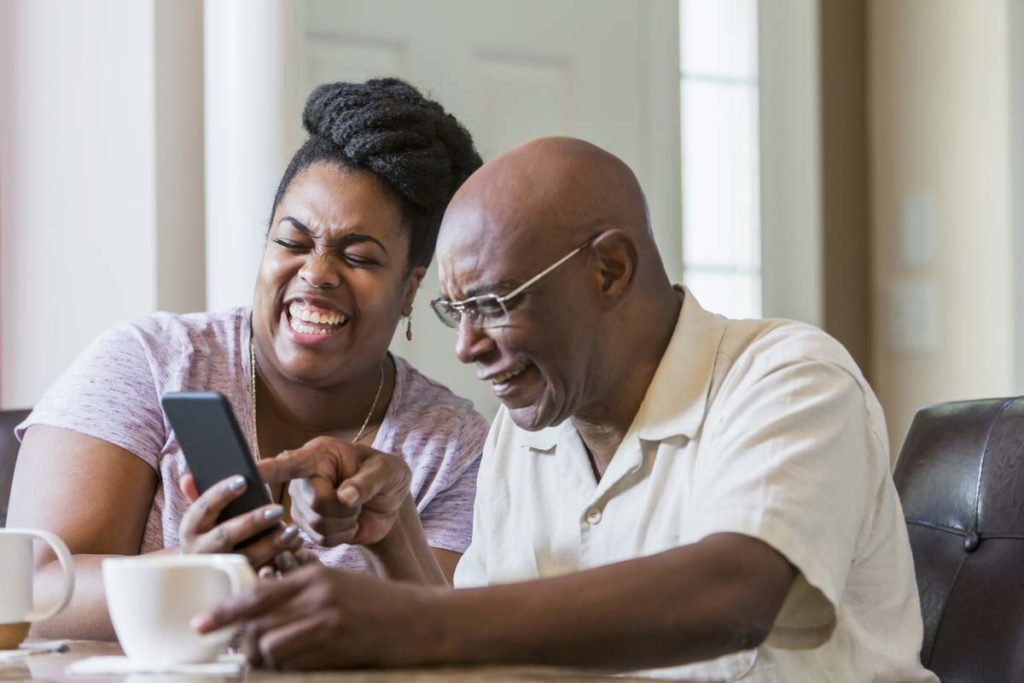
If you decide to buy a smartphone, your first task will be to choose between an iPhone and an Android. Ask any phone owner, and they’ll have a strong opinion on this topic. Here are the major differences between these phones.
iPhones
These devices are made by Apple, and they run a unique operating system called iOS. Some critics argue that iPhones are more intuitive to use than Androids, but it really depends on the user. Try both types of phone at a your local electronics store to find out which one you prefer. iPhones tend to feature tougher security than Androids, but they will cost you more than most Androids.
If you talk with your family members frequently, check with your loved ones and see what type of product they use before buying your own.
Androids
These devices run Android operating systems. While Apple only sells one type of phone—the iPhone—there are hundreds of Android devices. These devices run the price gamut, from $100–$1,000 or more. Some users prefer these devices because they’re more customizable, but others may feel overwhelmed by all the different options they offer. Just note that these phones won’t run any Apple apps. So if your grandchildren use FaceTime, you won’t be able to chat with them on this app unless you also have an iPhone. If you talk with your family members frequently, check with your loved ones and see what type of product they use before buying your own.
Locked or Unlocked?

You may hear people talk about phones being “locked” or “unlocked.” These terms just refer to whether or not the phone is tied to one network. For instance, if you buy a phone from AT&T, it will only work with that carrier. On the other hand, an unlocked phone is a free agent. That is, you can use it with any network you choose. Unlocked phones can be purchased through Amazon, or through ebay or Craigslist if you prefer to buy used. You’ll typically pay more for an unlocked device, thanks to the freedom and flexibility it provides.
Choosing a Plan
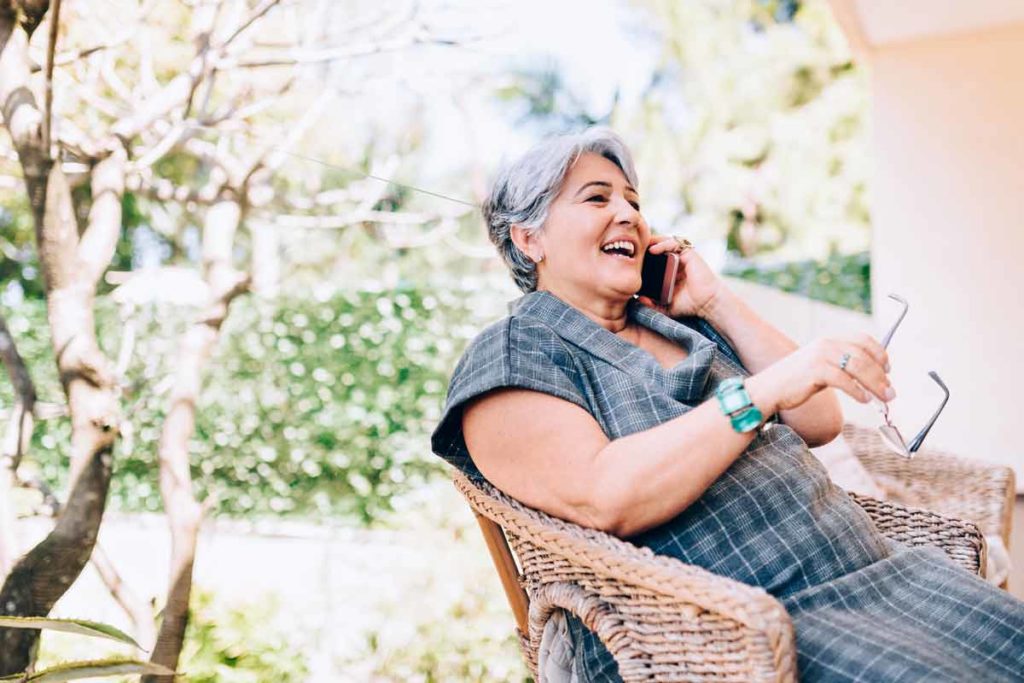
Pay As You Go
With these phone plans, the title says it all. You’ll never be tied into a contract, but instead pay for the phone as you use it. Some plans offer cheap monthly rates with a certain number of minutes and texts included. Other plans charge you a flat rate for each day you use your phone but provide unlimited minutes and texts.
When comparing phone networks, ask if they offer plans for older adults.
Flexible Plans
These plans charge you a base rate for each month, but this rate only covers keeping the phone in service. Any minutes, data, or texts you use will added to the monthly rate. Most of these plans charge by tiers, which means you’ll pay for whichever level of usage you reach each month. This might be a good choice if your cellphone use varies from month to month.
Unlimited Plans
These plans are a solid option if you plan to use apps, video, games, video chatting, or other features. With an unlimited plan, you can use as much data as you want without worrying about paying a huge fee at the end of the month. However, the world unlimited can be a little deceptive. While your carrier won’t charge you more for using a lot of data, your service may slow down at the end of the month, or you may lose the quality of the TV show or YouTube videos you are streaming. This is called throttling.
Older Adult-Specific Plans
When comparing phone networks, ask if they offer plans for older adults. You may be able to receive a discount on your plan if you’re over a certain age or qualify for certain special features. Some carriers provide health and safety packages that include doctor-on-call apps, wellness check-ins, and medication reminders just for older adults.
Other Features for Older Adults
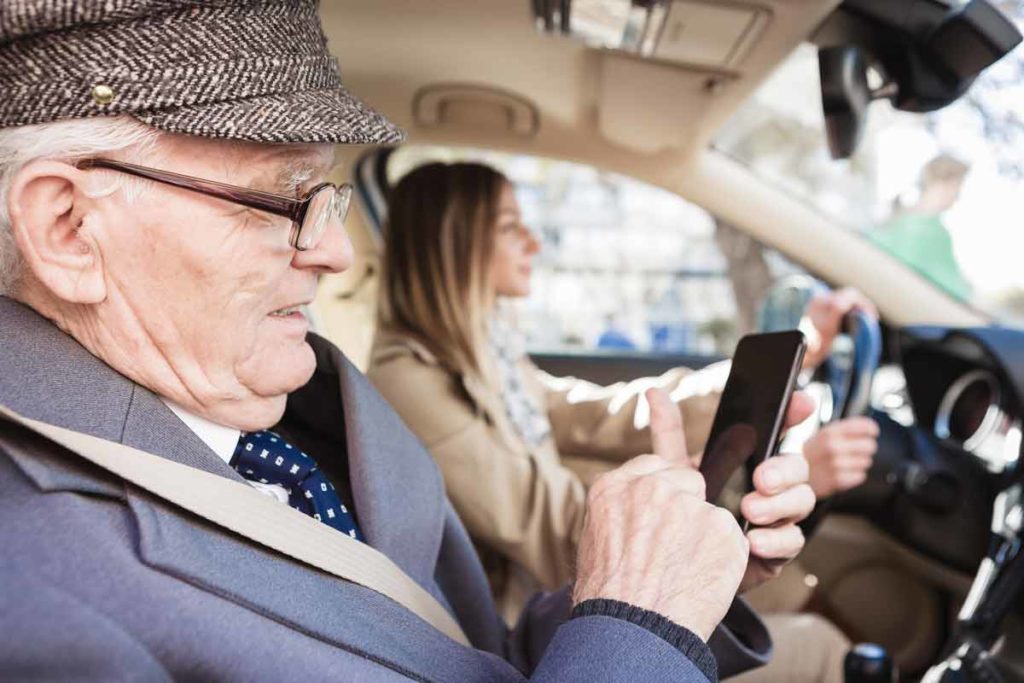
Volume
If you’re experiencing hearing loss, try looking for a phone with a louder volume range. Some phones are made specifically for the hearing impaired, and others are designed to be compatible with hearing aids. Also consider choosing a phone with a physical volume adjustment button, so you can easily change the volume without having to search for the right setting.
aginginplace.org/hearing-aids/best-for-iphone/(opens in a new tab)
Keypads can become jammed if they get dirty, and it can be harder to find certain symbols.
Touchscreen vs Keypad
If dexterity is an issue for you or your loved one, you’ll want to consider whether a mechanical keypad or touchscreen will be easier to use. Touch screens tend to be less accurate than mechanical keypads, since you’re typing on a flat screen with no raised surface. However, keypads can become jammed if they get dirty, and it can be harder to find certain symbols. Of course this decision also depends on whether you buy a smartphone or basic phone. Almost all smartphones will come with a touchscreen.
Camera
If you’re a frequent picture taker, you might want to look for a cellphone with a quality camera. You’re more likely to find this feature in higher-end smartphones, although even most basic cellphones come with a camera. Also, think about whether or not you’ll want to record videos or be able to video chat with family members.
Screen Size
Phone and screen size are factors to consider, whether you prefer a small phone that you can easily stash in your pocket or a phone with a large screen,so that you can read and type more easily. The size of your grip is also important to think about, so that you can comfortably hold the phone in one hand.
Emergency Button
Some phones designed specifically for older adults come with a physical button that will automatically dial an emergency phone number of your choosing. This could be helpful if you’re in distress and don’t have time to search for the right contact.
Fingerprint Recognition
Some of the newer model smart phones offer fingerprint recognition as a way of unlocking your device. You’ll program your fingerprint—and the fingerprints of anyone else you want to have access—into your phone during set-up. This is a great option for anyone who may have trouble remembering a security code, but still want to protect their phone.
Facial Recognition
Like fingerprint recognition, facial recognition in newer phones allows you to unlock your phone with your face, as well as purchase apps, access financial accounts, and more. This makes accessing your phone and other accounts simple, especially if you forget your password.
Customizable Settings for Older Adults
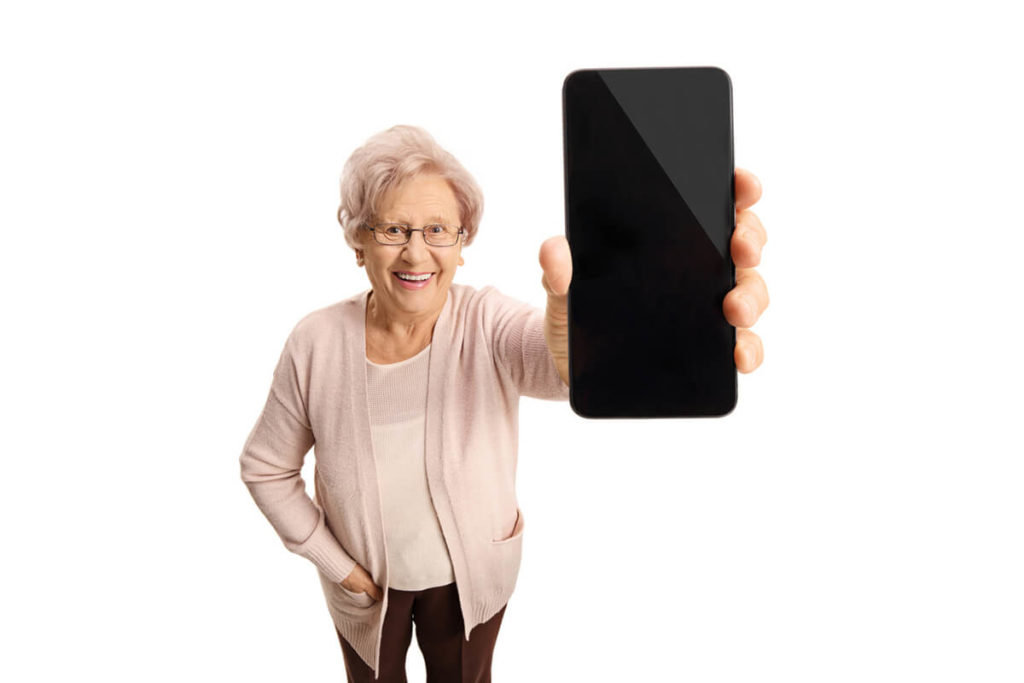
If you prefer not to buy an older adult-specific phone, but opt for a general model instead, there are still many settings you can customize to meet your needs. This is a great option if you inherited a cellphone from someone else, for example, or just want more flexibility than the phones made specifically for older adults provide.
Here are a few settings you can adjust to make the phone easier to use for older adults:
All apps that support this feature will then show closed captioning at the bottom.
Closed Captioning
Most phones include an option to turn on closed captioning for videos, whether you’re streaming a show or watching a YouTube video. All apps that support this feature will then show closed captioning at the bottom. If you have hearing loss you may find this trick especially helpful. You can find the closed captioning video feature by going in your phone’s settings app.
Icon Size
Most phone manufacturers space out icons to make the home screen appear more clean and organized, but this can be tough if you have vision issues. If you’d like to switch to a zoom view, you can also do this in your settings app.
Voiceover
This feature allows your phone to read aloud text on the screen. If you receive a text, for example, you’ll hear the message rather than having to read it. This can also be a great help if you have reduced vision.
Magnifying Camera
By switching on the magnifying feature, your phone’s camera can act as a magnifying glass, enlarging whatever subject you point it at. You may appreciate this option if you’re trying to decipher fine print on a document, for example, or read a menu in a small font. You can enable this feature on your phone’s settings app as well.
Buying a Case
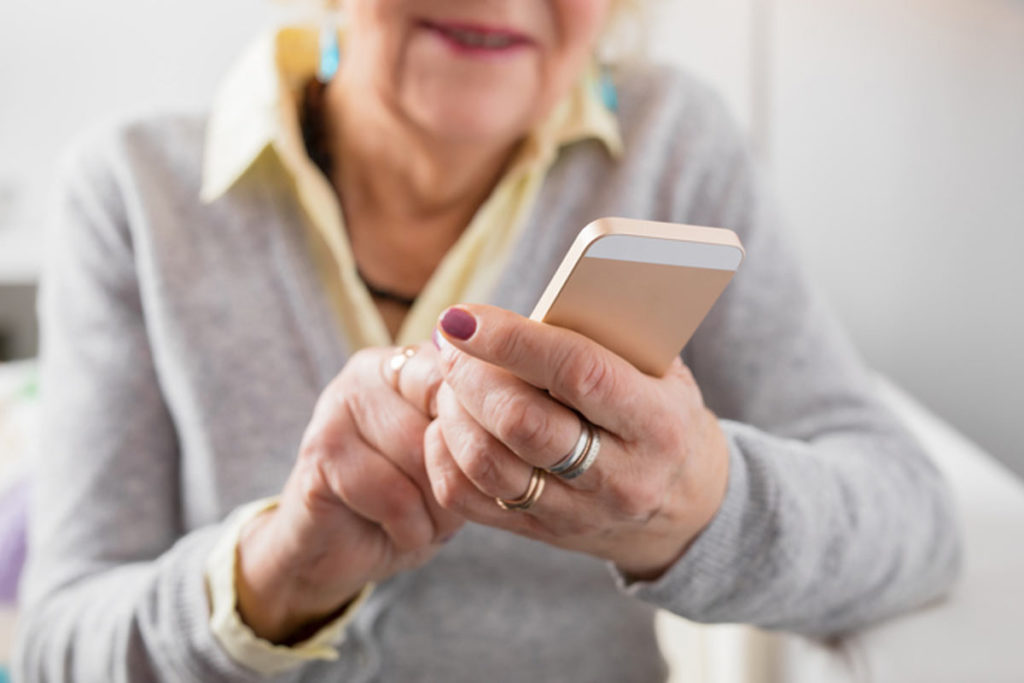
If you purchase a flip phone or block phone, chances are you won’t need a protective case. However, most smartphones come with a large glass screen that can easily break. For these devices, you’ll probably want to purchase a case to protect your device from being dropped. You can even find cases that are completely waterproof. Buying a protective case can help protect your investment and bring peace of mind.
For these devices, you’ll probably want to purchase a case to protect your device from being dropped.
Bottom Line
Cellphones can empower you to live more independently, secure in the knowledge that help is just a quick call away. Not only that, but you can find social connection through your cellphone, use photo sharing, social media, and video chat to better keep in touch with your friends and loved ones. You can also embrace a more convenient, self-sufficient lifestyle through some of the practical apps, like parking reminders, smart thermostat apps, and medical compliance apps that are available on smartphones today.
While there are many choices in the cellphone market, finding the right fit can help you maintain your lifestyle, as well as provide you a way to stay connected to your friends and family.
